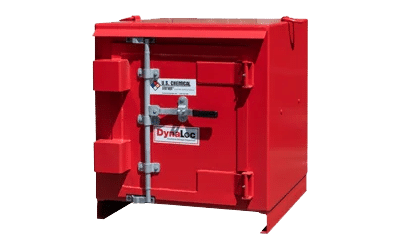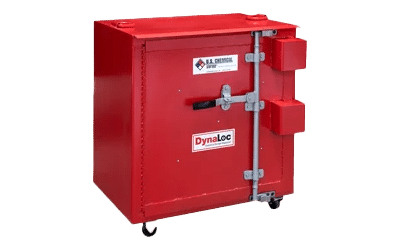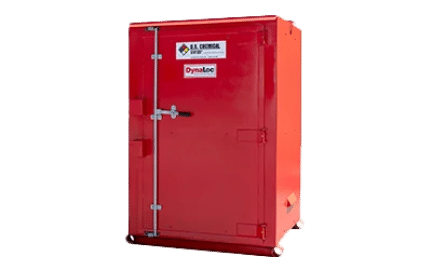DynaLoc® Type 3 Day Box Explosive Magazines for Transport
U.S. Chemical Storage designs and manufactures durable Type 3 explosive storage boxes, commonly referred to as “day boxes,” for the safe, temporary storage and transport of small quantities of explosives.

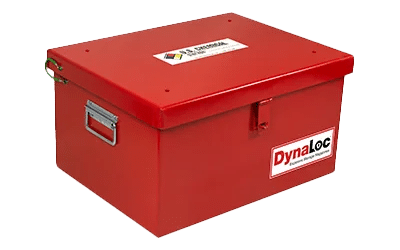
These magazines are essential for securely moving explosive materials from standard storage areas to job sites, training facilities, or other temporary locations.
Lightweight and portable, Type 3 dayboxes offer fire-resistant, weather-resistant, and theft-resistant protection, ensuring compliance with ATF 27 CFR, Part 555.208 and other safety regulations.
There are various types of Type 3 dayboxes available, tailored to specific storage and transport needs, including steel, aluminum, and IME/DOT-compliant dayboxes for transportation on public highways.
The flexibility in design allows for custom sizes and configurations to accommodate a range of explosive storage needs, including the combination of detonators and explosives in separate compartments.
Features & Benefits
- Non-sparking Interior – lined with plywood (or drywall for IME) to prevent sparking that could ignite stored explosives
- Fire-Resistant Construction – Built to withstand high temperatures, ensuring the safety of the contents in the event of a fire.
- Weather-Resistant Construction – Suitable for outdoor storage in various conditions, providing protection against moisture, heat, and other environmental factors.
- Overlapping Lid Design – The lid overlaps the sides by at least an inch, preventing unauthorized access and protecting against external elements.
- Single-Lock Door System – Hinges and hasps are welded to the door, ensuring they cannot be removed when closed and locked.
- High-Performance Coatings – Exterior surfaces are protected with a phenolic alkyd resin base coat and an acrylic alkyd enamel topcoat, providing resistance to chemicals, corrosion, abrasion, and UV damage
Common Applications
- Military & Law Enforcement Explosive and Ammunition Transport
- Municipal Explosive and Ammunition Transport
- Contractor Explosive Transport
- K-9 Training Unit Material Transport
Downloadable Information & Fact Sheets
Compliance & Approvals
U.S. Chemical Storage builds and delivers customized, high-quality, and fully compliant solutions for explosive storage that prioritize safety and operational efficiency.
Contact us today to design a custom solution for your specific needs.
- ATF 27 CFR, Part 555.208
Frequently Asked Questions
Day boxes are used for the transfer and temporary, supervised storage of your explosives. These magazines are light enough for daily transport from your overnight storage area to the job site. Our DynaLoc™ day boxes are constructed to be fire-resistant, weather-resistant, and theft-resistant.
Yes. High and low explosives that are placed in outdoor magazines should have a grounding system according to the NFPA 70 standard. Grounding protects your magazine and its contents against lightning strike, and it will need to be properly grounded by a licensed electrician. For more information, please refer to NFPA .
For storage purposes, federal requirements classify explosive materials according to their velocity. There are three classes of explosive materials, per ATF 27 CFR 555.202:
- High Explosives – explosives which detonate by means of a blasting cap (dynamite, emulsions, flash powders, etc.)
- Low explosives – explosives which deflagrate when confined (black powder, safety fuses, ignitor cords, “display fireworks,” etc.)
- Blasting agents – explosives consisting of fuel and oxidizer, intended for blasting and unable to detonated by a No. 8 test blasting cap when unconfined (ammonium nitrate-fuel oil and certain water-gels)
For more information, visit https://www.atf.gov/explosives/explosive-storage-requirements.
Yes! Like all our safe storage solutions, U.S. Chemical Storage can provide custom designs to fit your needs. Dividers, shelves, combination designs and more are things we routinely do for clients. For assistance creating a custom solution for your storage needs, contact one of our experts.
No. A common misconception is explosive storage magazines will contain a blast inside the unit—this is not the case. Explosive storage magazines work as a safeguard against theft and accidental detonation by improper storage and the environment.
Each class requires a unique storage solution to ensure optimal safety and management. Type 2 is for storage of high explosives, Type 4 is for storage of low explosives, and Type 3 are day boxes that are used to transport both high and low explosives.
Our Type 2 and Type 4 explosive storage magazines are available in both indoor and outdoor styles, and every storage type we offer features theft-resistant, weather-resistant, and fire-resistant construction.
We offer both steel and aluminum day boxes to transport explosives. If you need to repeatedly unload and load your day box and weight is a concern, an aluminum model helps reduce weight while still meeting ATF requirements.
Additionally, our IME DOT dayboxes meet stringent SLP 22 requirements for “Recommendation for the Safe Transportation of Detonators in a Vehicle with Certain Other Explosive Materials.”
Request a Quote
How To Measure and Order Your Magazine
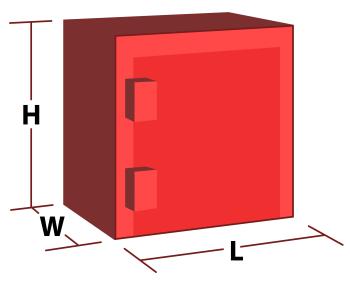
- Interior dimensions below are given as LxWxH.
- Measurements are from wall to wall, and may not account for 1/4 round in corners, or bracing pieces in larger pieces. Make sure your explosive material has plenty of room.
- If you require interior shelving or ATF approved padlocks, please state so at time of order.
- Cap boxes can be engineered and welded to the side of any model as a custom order.
- Provide your zip code in the form for a faster freight calculation.
Click ‘Request Quote’ on any product below to contact our sales team.
Steel DynaLoc® Type 3 Day Box Explosive Magazines for Transport
Steel type 3 day boxes are the most common and are designed for durable and secure transport of high and low explosives. They are constructed from 12-gauge steel and lined with ½-inch plywood to create a non-sparking interior that minimizes the risk of accidental ignition.
- Decades of experience creating explosive magazine solutions
- Meet and exceed ATF 27 CFR, Part 555.208
- Strong 12-gauge steel constructed
- Top opening lid with required 1″ overlap for security
- A single, hand-welded locking security hasps
- Hand-welded with
- Continuous hinge for strong and smooth operation
- 1/2″ thick quality plywood non-sparking interior
- Fire-resistant, bullet-resistant, and weather-resistant construction for protection on the move
- Quick-ship models are available
- Custom solutions engineered to your specifications
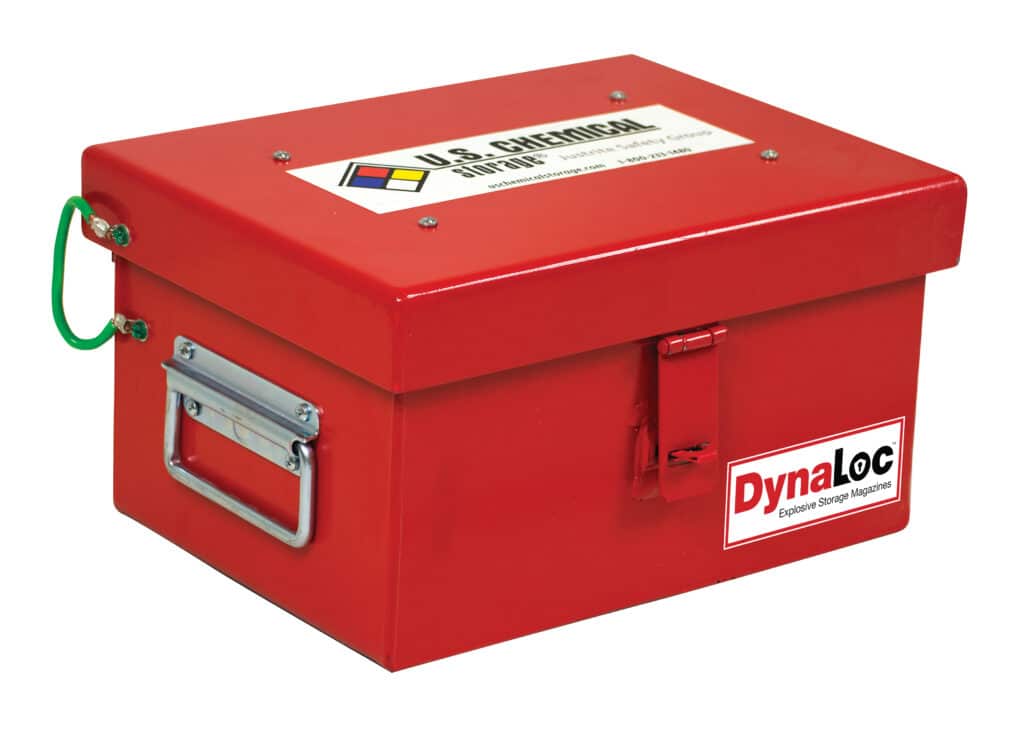
Type 3 Day Box | EL 510
Dimensions (Exterior): 15.5 x 11.5 x 8.25in
Dimensions (Interior): 12.5 x 8.5x 6.75in
Approximate Weight: 40 lbs.
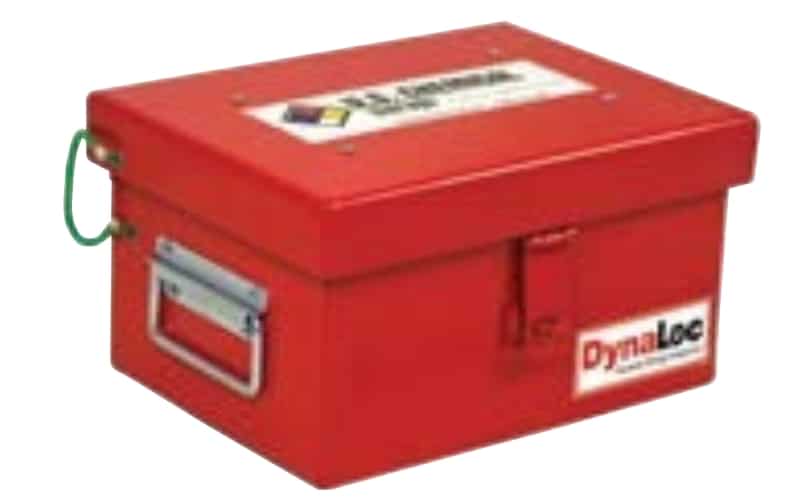
Type 3 Day Box | EL511
Dimensions (Exterior): 16.5 x 14.5 x 9.25in
Dimensions (Interior): 13.5 x 11.5 x 7.75in
Approximate Weight: 40 lbs.
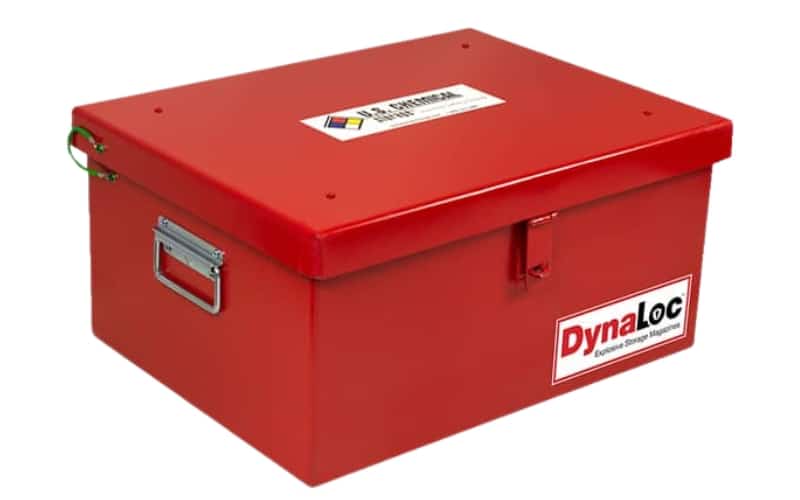
Type 3 Day Box | EL 521
Dimensions (Exterior): 25.5 x 19.5 x 12.25in
Dimensions (Interior): 22.5 x 16.5 x 10.75in
Approximate Weight: 94 lbs.
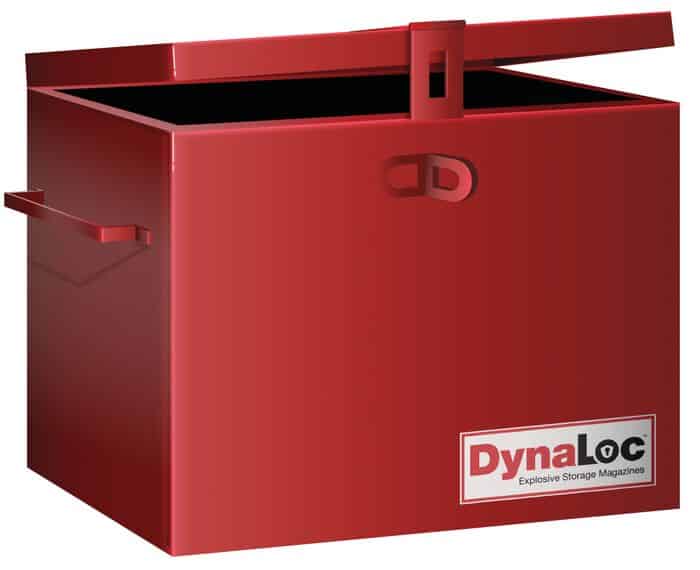
Type 3 Day Box | EL 531
Dimensions (Exterior): 25.5 x 19.5 x 18.25in
Dimensions (Interior): 22.63 x 16.63 x 16.75in
Approximate Weight: 119 lbs.
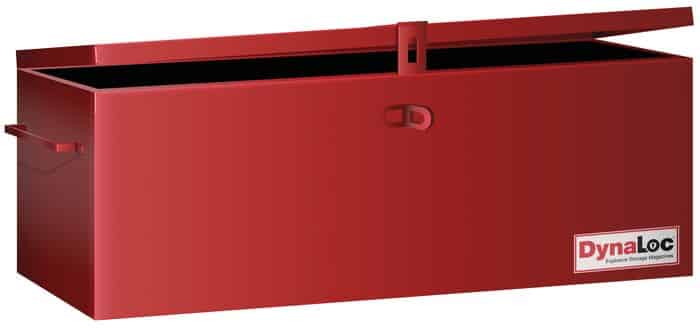
Type 3 Day Box | EL 541
Dimensions (Exterior): 48 x 18 x 18in
Dimensions (Interior): 46.8 x 16.8 x 16.8in
Approximate Weight: 203 lbs.
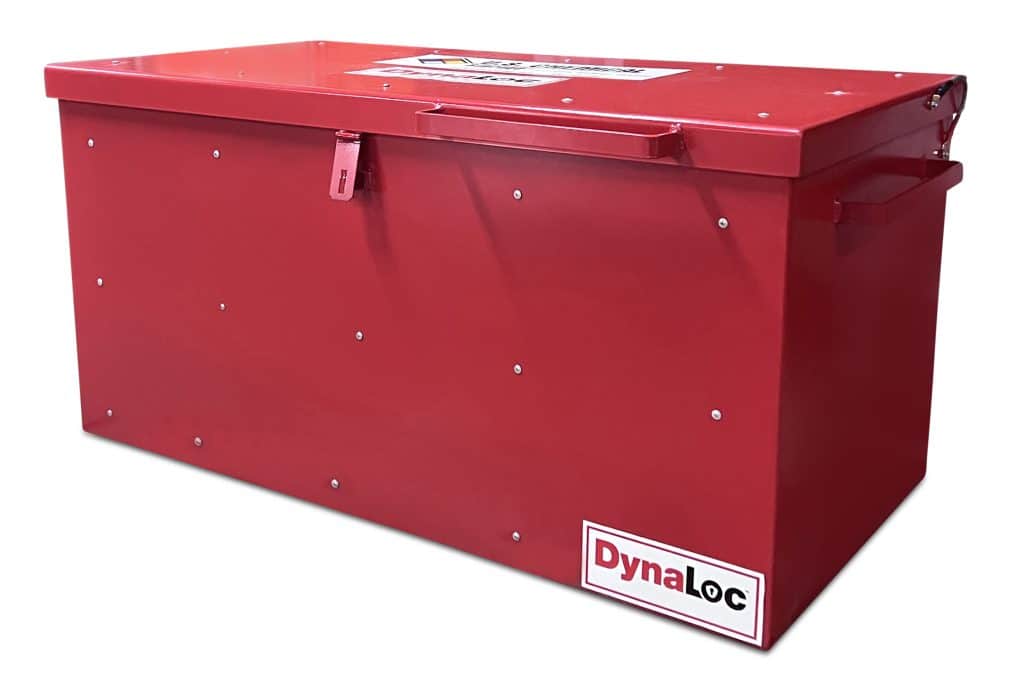
Type 3 Day Box | EL 542
Dimensions (Exterior): 48 x 24 x 24in
Dimensions (Interior): 46.8 x 22.8 x 22.8in
Approximate Weight: 271 lbs.
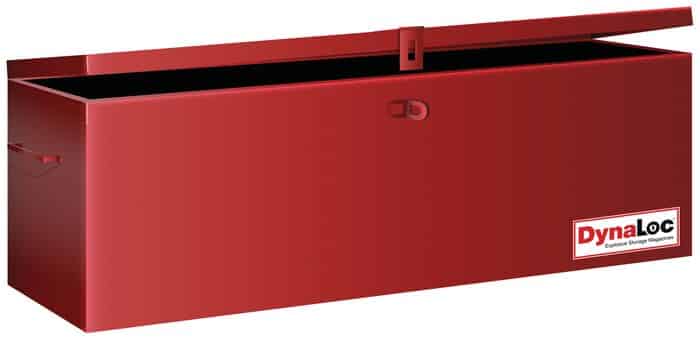
Type 3 Day Box | EL 551
Dimensions (Exterior): 60 x 24 x 24in
Dimensions (Interior): 58.8 x 22.8 x 22.8in
Approximate Weight: 352 lbs.
Aluminum DynaLoc® Type 3 Day Box Explosive Magazines for Transport
Aluminum day boxes are an excellent alternative to steel day boxes when weight is a concern. These lightweight boxes provide the same fire-resistant and weather-resistant features but are easier to handle, especially for repeated loading and unloading from vehicles. Ideal for teams requiring frequent repositioning or repeated loading/unloading of explosive materials from vehicles and sites and to larger magazine storage.
- Decades of experience creating explosive magazine solutions
- Still meets ATF 27 CFR, Part 555.208
- 0.100 aluminum construction is hand-welded for strength
- Top opening lid with required 1″ overlap for security
- A single, hand-welded locking security hasp
- Continuous hinge for strong and smooth operation
- 1/2″ thick quality plywood non-sparking interior
- Aluminum day boxes are for a lighter-weight requirement and an ergonomic feature during repetitive movement
- Fire-resistant and weather-resistant construction for protection on the move
- Custom solutions can be engineered to your specifications
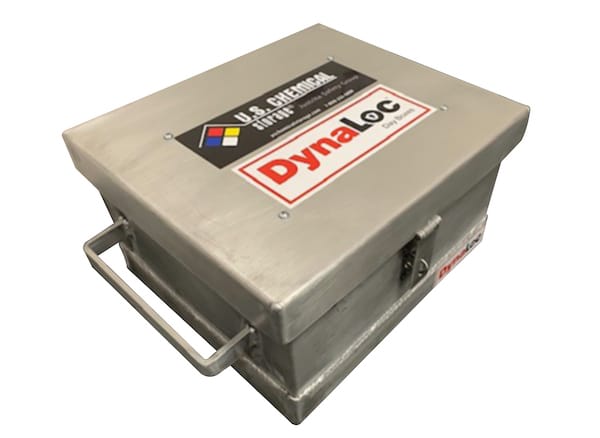
Type 3 Aluminum Day Box | AEL 511
Dimensions (Exterior): 19.25 x 14.75 x 9 in
Dimensions (Interior): 13.5 x 11.5 x 7.75 in
Approximate Weight: 25 lbs.
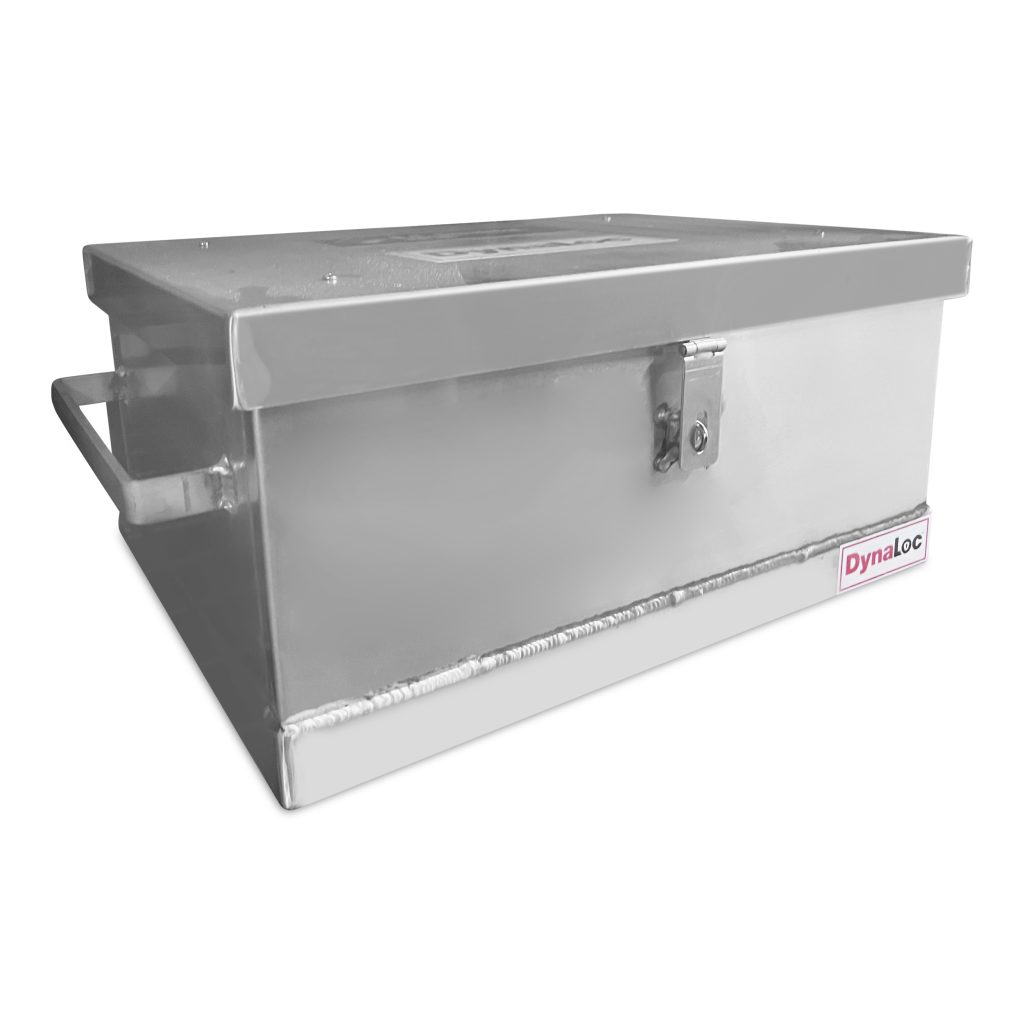
Type 3 Aluminum Day Bo | AEL 521
Dimensions (Exterior): 24 x 18 x 12 in
Dimensions (Interior): 22.8 x 16.8 x 10.8 in
Approximate Weight: 49 lbs.

Type 3 IME/DOT Day Box | AEL 531
Dimensions (Exterior): 28.25 x 19.63 x 18 in
Dimensions (Interior): 22.63 x 16.63 x 16.75 in
Approximate Weight: 69 lbs.
IME/DOT DynaLoc® Type 3 Day Box Explosive Magazines for Transport
The Department of Transportation (DOT) requires that when explosives and detonators are transported within the same vehicle on public roads and highways, at least ONE of the transport boxes must be manufactured to the Institute of Makers of Explosives (IME) specification outlined in “Safety Library Publication” SLP-22. It dictates extra fireproofing to the interior of the container. This is usually achieved via layers of gypsum board (sheetrock) to increase safety in the event of a crash to allow more time for escape or clearing of the area. The regulation also details where and how the containers should be placed within the vehicle.
- Decades of experience creating explosive magazine solutions
- Meets ATF 27 CFR, Part 555.208 and IME SLP-22
- Strong 12-gauge steel constructed is hand-welded for strength
- When use transporting explosives and detonators at the same time
- Top opening lid with required 1″ overlap for security
- A single, hand-welded locking security hasp
- Continuous hinge for strong and smooth operation
- Lined with 3/4″ fire-rated gypsum board and 3/4″ plywood for a more fire-resistant interior
- Fire-resistant and weather-resistant construction for protection on the move
- Custom solutions engineered to your specifications
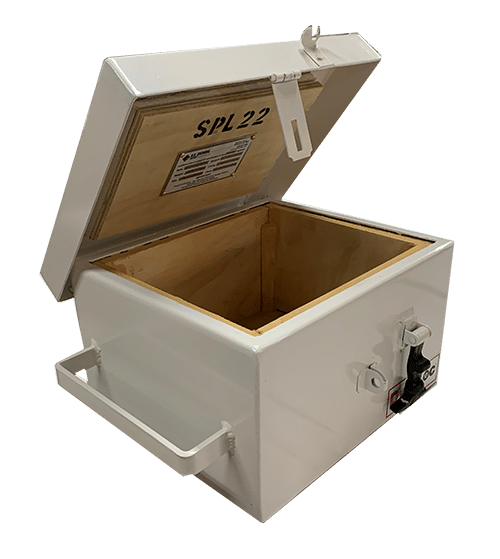
Type 3 IME/DOT Day Box | EL 401
Dimensions (Exterior): 14 x 12 x 8in
Dimensions (Interior): 11 x 9 x 5 in
Approximate Weight: 64 lbs.
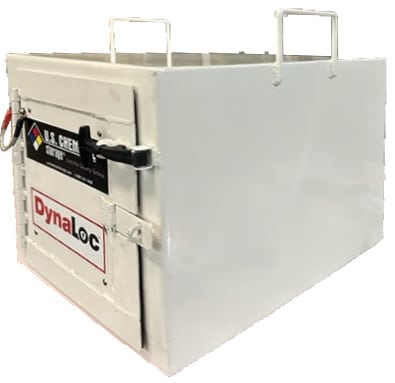
Type 3 IME/DOT Day Box | EL 731
Dimensions (Exterior): 17 x 24 x 18 in
Dimensions (Interior): 14 x 21 x 15 in
Approximate Weight: 130 lbs.

Type 3 IME/DOT Day Box | EL 751 Combination Day Box and IME
Dimensions (Exterior): 42 x 24 x 24 in
Dimensions (Interior): contact for drawing
Approximate Weight: 371 lbs.

Type 3 IME/DOT Day Box | EL 755 Combination Day Box and IME
Dimensions (Exterior): 60 x 24 x 24 in
Dimensions (Interior): contact for drawing
Approximate Weight: 496 lbs.
U.S. Chemical Storage is Here to Help
U.S. Chemical Storage’s Type 3 day boxes provide the ultimate safety, security, and compliance for the temporary storage and transport of high and low explosives.
Whether for military use, law enforcement, or commercial contractors, our range of steel, aluminum, and IME/DOT dayboxes ensures that your explosive materials are safely managed in accordance with federal regulations and industry best practices.
For more information on choosing the right day box for your needs or to explore custom solutions, contact our team of experts today.
OTHER DYNALOC® EXPLOSIVE MAGAZINE TYPES AVAILABLE
DynaLoc® Type 2 Outdoor Magazine
For storing high explosives outside your facility. The steel construction-lined hardwood storage magazines keeps your explosive components or ammunition secure and safe from theft and weather events. View Product >DynaLoc® Type 2 Indoor Magazines
For storing high explosives (up to 50 lbs.) inside your facility. The portable steel construction-lined hardwood storage magazines keeps your explosives secure. View Product >DynaLoc® Type 4 for Low Explosives
For indoor or outdoor, long-term storage of low explosives. All include forklift pockets and crane lifting lugs to easily move or relocate. Protected ventilation and double lock security hasps keep the heavy-duty cam lock handle secure. View Product >Request a Quote
Fill out this form to get a quote for our product.

